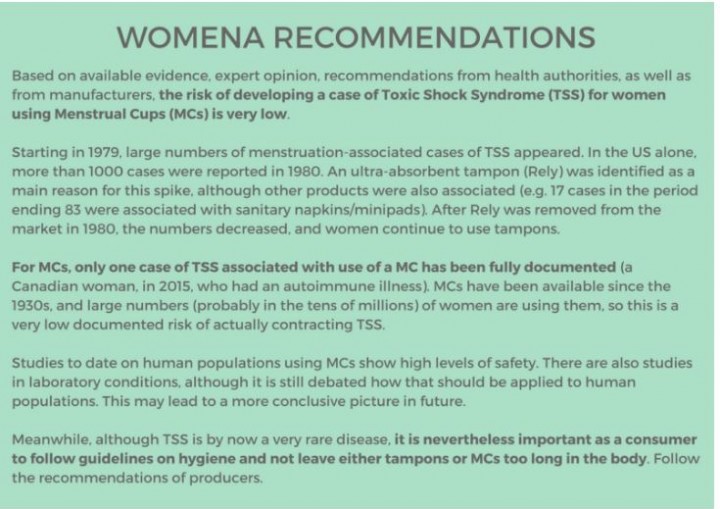WoMena FAQs: Does the use of menstrual cups increase the risk of toxic shock syndrome?
WoMena (2018)

Published in: 2018
Pages: 7
Publisher:
WoMena
Author:
WoMena
Uploaded by:
Marianne Tellier
Partner profile:
WoMena
2050 Views
1 Downloads
WOMENA RECOMMENDATIONS
The risk of developing Toxic Shock Syndrome (TSS) for women using Menstrual Cups (MCs) is very
low.
In 1979-80, large numbers of menstruation-associated cases of TSS appeared. In the US alone, more than 1000 cases were reported in 1980. An ultra-absorbent tampon (Rely) was identified as a main reason for this spike, but many other products were also associated, for example 17 cases were associated with sanitary napkins/minipads. After Rely was removed from the market in 1980, the numbers decreased to very low levels, and women continue to use tampons.
For MCs, there has been only one fully documented case of TSS associated with use of a MC. This was in a Canadian woman, in 2015, who had an autoimmune illness. MCs have been available since the 1930s, and large numbers (probably in the tens of millions) of women are using them, so this is a very low documented risk of actually contracting TSS, especially when compared to other products.
Studies to date on human populations using MCs show high levels of safety. There are also studies in laboratory conditions, but it is still debated how that should be applied to human populations. This may lead to a more conclusive picture in future.
Meanwhile, although TSS is by now a very rare disease, it is nevertheless important as a consumer to follow guidelines on hygiene and not leave either tampons or MCs too long in the body. Follow the recommendations of producers.
Bibliographic information
WoMena (2018). WoMena FAQs: Does the use of menstrual cups increase the risk of toxic shock syndrome?. WoMena
Filter tags
English Factsheets and policy briefs Menstrual Health and Hygiene (MHH)














